Local
Capital TransPride draws nearly 150 to Southwest
Panel discussed anti-trans violence and District police’s response
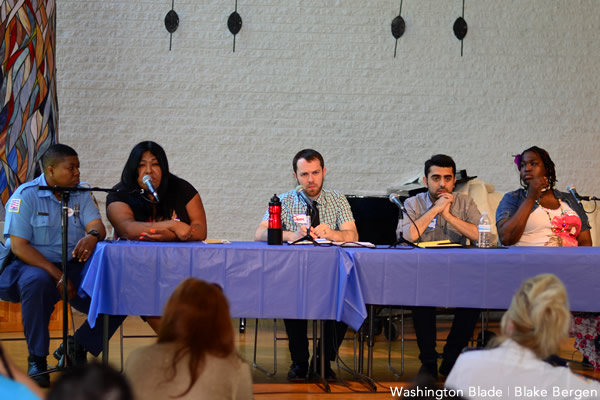

Panelists discuss anti-transgender violence and the Metropolitan Police Department’s response to it during Capital TransPride on Saturday (Washington Blade photo by Blake Bergen)
Nearly 150 people gathered at the Westminster Presbyterian Church in Southwest on Saturday for the sixth annual Capital TransPride.
Author Everett Maroon delivered the keynote address; while Helping Individual Prostitutes Survive executive director Cyndee Clay, Rainbow History Fund founder Mark Meinke and TransPride founder SaVanna Wanzer were honored for their work on behalf of trans Washingtonians. Transgender Health Empowerment, the Latino History Project, the Gay and Lesbian Activists Alliance and Equality Maryland were among the more than 20 organizations that co-sponsored the event.
“We reached a much larger audience than we did last year,” noted Capital TransPride Co-Chair Holly Goldmann, who is also a D.C. LGBT Community Center board member.
Former Sexual Minority Youth Assistance League member Terra Moore, Gays and Lesbians Opposing Violence vice chair Hassan Naveed, Jason Terry of the D.C. Trans Coalition, trans activist Ruby Corado and Officer Juanita Foreman of the Metropolitan Police Department’s Gay and Lesbian Liaison Unit discussed anti-trans violence in the District on a panel that former TransPride chair Danielle King moderated.
Corado, whose community center for LGBT Latinos in Columbia Heights is slated to open on June 6, said the situation for trans Washingtonians has improved over the last decade. Challenges, however, remain.
“These days we do have the ability that we can be ourselves and we can actually function during the day,” said Corado. “We come out in different neighborhoods in this city. There are people who are really willing to embrace us and have done so well. However, we still have other people that are not quite receptive of the idea of a trans person being themselves.”
MPD statistics show that there were 10 reported bias-related crimes based on gender identity and expression in the city in 2010, compared to five in 2009 and four in 2008.
A National Coalition of Anti-Violence Programs report indicates that 70 percent of anti-LGBT murder victims in 2010 were people of color—and 44 percent of them were trans women. The NCAVP study further noted that trans people and people of color are twice as likely to experience violence or discrimination than non-trans white people. The report also indicates that trans people of color are more than twice as likely to experience discrimination than whites.
Lashay Mclean’s murder last July in Northeast and the subsequent spate of anti-trans violence that included an off-duty District police officer allegedly shooting three trans women and two male friends while they sat in a car underscores the problem. Prosecutors charged Gary Niles Montgomery with second-degree murder while armed in connection with the stabbing death of Deoni Jones at a Northeast Metro bus stop on Feb. 2.
“It’s time we look at ourselves and come together,” said Corado in response to King’s question about what trans women of color can do to curb violence directed against them. “You really need to take an active role because until we become part of the solution, you can’t expect someone else to do it for us.”
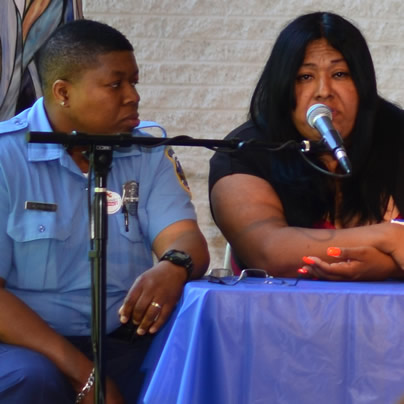
From left; Officer Juanita Foreman and transgender activist Ruby Corado discuss anti-trans violence in the District.
Corado and several other panelists were quick to applaud GLLU and the MPD’s efforts over the last year to combat anti-trans violence in the city. Terry described D.C. Mayor Vincent Gray as the most trans-friendly administration the city has ever seen, but he stressed that City Hall has not done enough to ensure trans Washingtonians’ safety.
“We have to get serious in addressing biased policing in this city,” Terry said.
Terry also cited Police Chief Cathy Lanier’s comments during a WTOP interview in February that trans people need to do more to keep themselves safe as another example of what he described as blaming the victim. “It’s not your fault if you’re victimized,” he stressed. “It’s not your fault.”
Assistant Police Chief Diane Groomes stressed at the end of the panel that the department remains committed to combating bias-related crimes in the city. She added the MPD has a system in place to respond to officers who do “not do what they’re supposed to do.”
“If there is an issue, do let us know,” said Groomes.
Police spokesperson Gwendolyn Crump further defended the MPD’s approach.
“One of the District’s most attractive qualities is that it is open and welcoming to people of all nations, races, sexual orientation and gender identity. Intolerance and hate crimes have no place in our vibrant city,” she told the Blade. “With 100 officers and almost all detectives trained to work with the LGBT community to address crimes of all types, we have more resources dedicated than ever before. This in turn helps us to make arrests, as we did in the recent IHOP shooting, and prevent the next crime and victimization.”
Jeffrey Richardson, director of the Mayor’s Office of GLBT Affairs, echoed Crump.
“While our city as a whole, still has much work to do on these issues, the Gray administration has made major strides to open the lines of communication with community partners and leverage resources to address some core issues facing the community,” he said, noting that the District’s community engagement remains far more advanced than in other cities around the country. “There’s always going to be more we can do to respond to trends, shift culture and change behavior. It is our commitment to keep our lines of communication open and work in partnership to make the District a safer place for all residents.”
District of Columbia
Eleanor Holmes Norton ends 2026 reelection campaign
Longtime LGBTQ rights supporter introduced, backed LGBTQ-supportive legislation
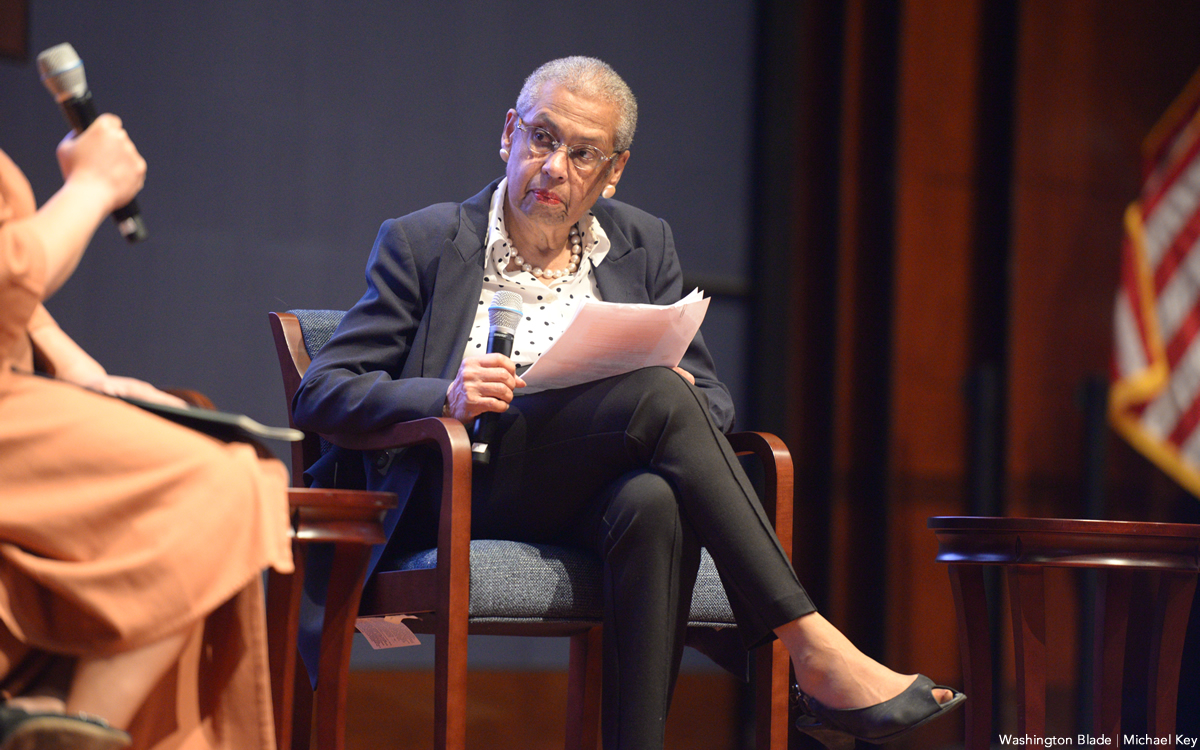
The reelection campaign for D.C. Congressional Delegate Eleanor Holmes Norton, who has been an outspoken supporter of LGBTQ rights since first taking office in 1991, filed a termination report on Jan. 25 with the Federal Elections Commission, indicating she will not run for a 19th term in the U.S. House of Representatives.
Norton’s decision not to run again, which was first reported by the online news publication NOTUS, comes at a time when many of her longtime supporters questioned her ability to continue in office at the age of 88.
NOTUS cited local political observers who pointed out that Norton has in the past year or two curtailed public appearances and, according to critics, has not taken sufficient action to oppose efforts by the Trump-Vance administration and Republican members of Congress to curtail D.C.’s limited home rule government.
Those same critics, however, have praised Norton for her 35-year tenure as the city’s non-voting delegate in the House and as a champion for a wide range of issues of interest to D.C. LGBTQ rights advocates have also praised her longstanding support for LGBTQ rights issues both locally and nationally.
D.C. gay Democratic Party activist Cartwright Moore, who has worked on Norton’s congressional staff from the time she first took office in 1991 until his retirement in 2021, points out that Norton’s role as a staunch LGBTQ ally dates back to the 1970s when she served as head of the New York City Commission on Human Rights.
“The congresswoman is a great person,” Moore told the Washington Blade in recounting his 30 years working on her staff, most recently as senior case worker dealing with local constituent issues.
Norton has been among the lead co-sponsors and outspoken supporters of LGBTQ rights legislation introduced in Congress since first taking office, including the currently pending Equality Act, which would ban employment discrimination based on sexual orientation and gender identity.
She has introduced multiple LGBTQ supportive bills, including her most recent bill introduced in June 2025, the District of Columbia Local Juror Non-Discrimination Act, which would ban D.C. residents from being disqualified from jury service in D.C. Superior Court based on their sexual orientation or gender identity.
For many years, Norton has marched in the city’s annual Pride parade.
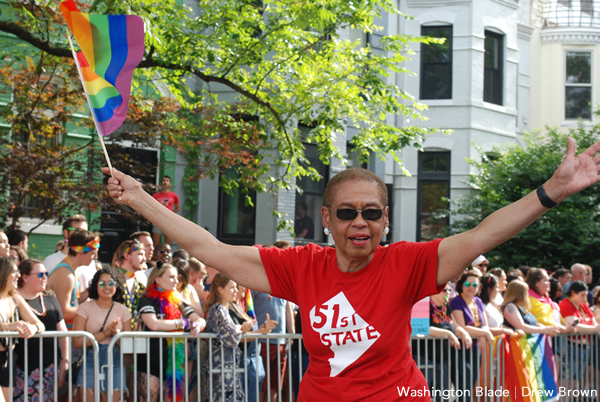
Her decision not to run for another term in office also comes at a time when, for the first time in many years, several prominent candidates emerged to run against her in the June 2026 D.C. Democratic primary. Among them are D.C. Council members Robert White (D-At-Large) and Brooke Pinto (D-Ward 2).
Others who have announced their candidacy for Norton’s seat include Jacque Patterson, president of the D.C. State Board of Education; Kinney Zalesne, a local Democratic party activist; and Trent Holbrook, who until recently served as Norton’s senior legislative counsel.
“For more than three decades, Congresswoman Norton has been Washington, D.C.’s steadfast warrior on Capitol Hill, a relentless advocate for our city’s right to self-determination, full democracy, and statehood,” said Oye Owolewa, the city’s elected U.S. shadow representative in a statement. “At every pivotal moment, she has stood firm on behalf of D.C. residents, never wavering in her pursuit of justice, equity, and meaningful representation for a city too often denied its rightful voice,” he said.
Sharon Nichols, who serves as press spokesperson for Norton’s congressional office, couldn’t immediately be reached for a comment by Norton on her decision not to seek another term in office.
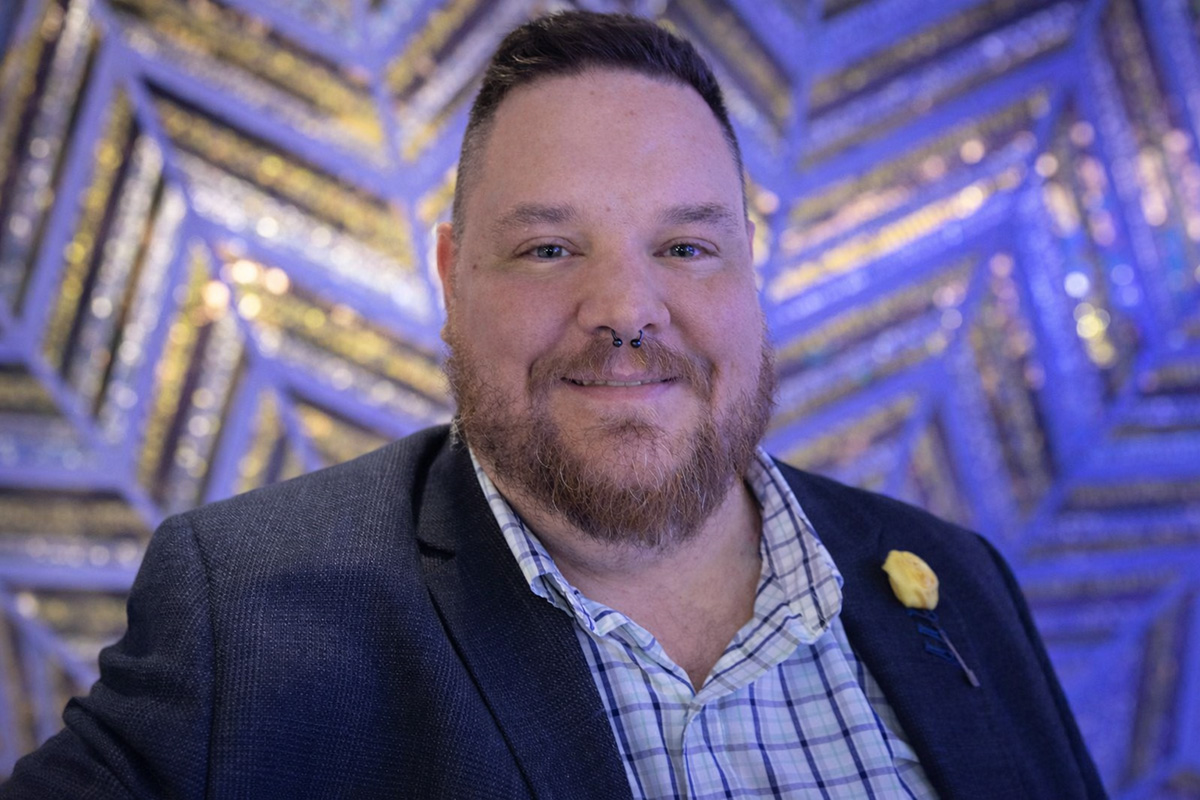
The Comings & Goings column is about sharing the professional successes of our community. We want to recognize those landing new jobs, new clients for their business, joining boards of organizations and other achievements. Please share your successes with us at [email protected].
The Comings & Goings column also invites LGBTQ+ college students to share their successes with us. If you have been elected to a student government position, gotten an exciting internship, or are graduating and beginning your career with a great job, let us know so we can share your success.
Congratulations to R. Warren Gill III, M.Div., M.A. on being appointed as the development manager at HIPS. Upon his appointment, Gill said, “For as long as I’ve lived in Washington, D.C., I’ve followed and admired the life-saving work HIPS does in our communities. I’m proud to join the staff and help strengthen the financial support that sustains this work.”
Gill will lead fundraising strategy, donor engagement, and institutional partnerships. HIPS promotes the health, rights, and dignity of individuals and communities impacted by sexual exchange and/or drug use due to choice, coercion, or circumstance. HIPS provides compassionate harm reduction services, advocacy, and community engagement that is respectful, non-judgmental, and affirms and honors individual power and agency.
Gill has built a career at the intersection of progressive politics, advocacy, and nonprofit leadership. Previously he served as director of communications at AIDS United, supporting national efforts to end the HIV epidemic. Prior to that he had roles including; being press secretary for Sen. Bernie Sanders during the 2016 presidential primary, and working with the General Board of Church and Society, the United Methodist Church, the denomination’s social justice and advocacy arm.
Gill earned his bachelor’s degree in philosophy and religious studies, Jewish Studies, Stockton University; his master’s degree in political communication from American University, where his graduate research focused on values-based messaging and cognitive linguistics; and his master of Divinity degree from the Pacific School of Religion.
District of Columbia
Judge denies D.C. request to dismiss gay police captain’s anti-bias lawsuit
MPD accused of illegally demoting officer for taking family leave to care for newborn child
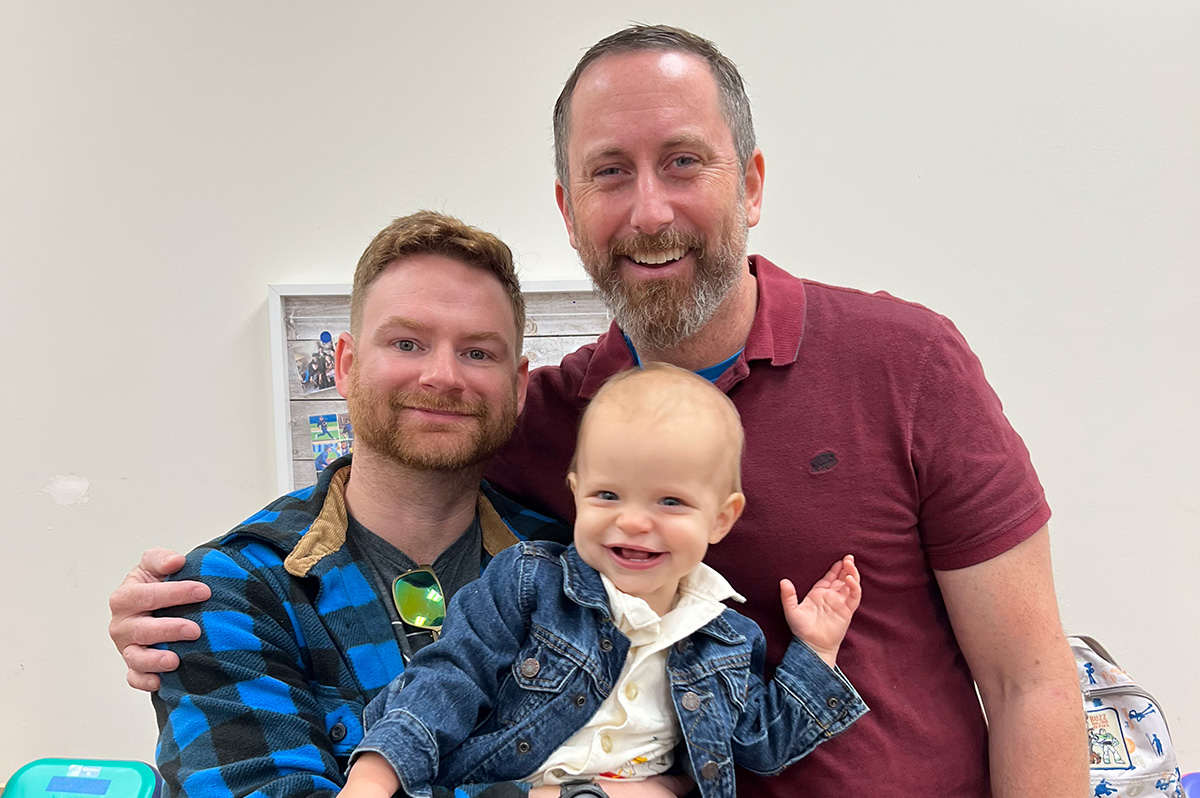
A U.S. District Court judge on Jan. 21 denied a request by attorneys representing the D.C. Metropolitan Police Department to dismiss a lawsuit filed by a gay captain accusing police officials of illegally demoting him for taking parental leave to join his husband in caring for their newborn son.
The lawsuit filed by Capt. Paul Hrebenak charges that police officials violated the U.S. Family and Medical Leave Act, a similar D.C. family leave law, and the Constitution’s Equal Protection Clause by refusing to allow him to return to his position as director of the department’s School Safety Division upon his return from parental leave.
It says police officials transferred Hrebenak to another police division against his wishes, which was a far less desirable job and was the equivalent of a demotion, even though it had the same pay grade as his earlier job.
In response to a motion filed by attorneys with the Office of the D.C. Attorney General, which represents and defends D.C. government agencies against lawsuits, Judge Randolph D. Moss agreed to dismiss seven of the lawsuit’s 14 counts or claims but left in place six counts.
Scott Lempert, the attorney representing Hrebenak, said he and Hrebenak agreed to drop one of the 14 counts prior to the Jan. 21 court hearing.
“He did not dismiss the essential claims in this case,” Lempert told the Washington Blade. “So, we won is the short answer. We defeated the motion to dismiss the case.”
Gabriel Shoglow, a spokesperson for the Office of the D.C. Attorney General, said the office has a policy of not commenting on pending litigation and it would not comment on the judge’s ruling upholding six of the lawsuit’s initial 14 counts.
In issuing his ruling from the bench, Moss gave Lempert the option of filing an amended complaint by March 6 to seek the reinstatement of the counts he dismissed. He gave attorneys for the D.C. attorney general’s office a deadline of March 20 to file a response to an amended complaint.
Lempert told the Blade he and Hrebenak have yet to decide whether to file an amended complaint or whether to ask the judge to move the case ahead to a jury trial, which they initially requested.
In its 26-page motion calling for dismissal of the case, filed on May 30, 2025, D.C. Office of the Attorney General attorneys argue that the police department has legal authority to transfer its officers, including captains, to a different job. It says that Hrebenak’s transfer to a position of watch commander at the department’s First District was fully equivalent in status to his job as director of the School Safety Division.
“The Watch Commander position is not alleged to have changed plaintiff’s rank of captain or his benefits or pay, and thus plaintiff has not plausibly alleged that he was put in a non-equivalent position,” the motion to dismiss states.
“Thus, his reassignment is not a demotion,” it says. “And the fact that his shift changed does not mean that the position is not equivalent to his prior position. The law does not require that every single aspect of the positions be the same.”
Hrebenak’s lawsuit states that “straight” police officers have routinely taken similar family and parental leave to care for a newborn child and have not been transferred to a different job. According to the lawsuit, the School Safety Division assignment allowed him to work a day shift, a needed shift for his recognized disability of Crohn’s Disease, which the lawsuit says is exacerbated by working late hours at night.
The lawsuit points out that Hrebenak disclosed he had Crohn’s Disease at the time he applied for his police job, and it was determined he could carry out his duties as an officer despite this ailment, which was listed as a disability.
Among other things, the lawsuit notes that Hrebenak had a designated reserved parking space for his earlier job and lost the parking space for the job to which he was transferred.
“Plaintiff’s removal as director at MPD’s School Safety Division was a targeted, premeditated punishment for his taking statutorily protected leave as a gay man,” the lawsuit states. “There was no operational need by MPD to remove plaintiff as director of MPD’s School Safety Division, a position in which plaintiff very successfully served for years,” it says.
In another action to strengthen Hrebenak’s opposition to the city’s motion to dismiss the case, Lempert filed with the court on Jan. 15 a “Notice of Supplemental Authority” that included two controversial reports that Lempert said showed that former D.C. Police Chief Pamela Smith put in place a policy of involuntary police transfers “to effectively demote and end careers of personnel who had displeased Chief Smith and or others in MPD leadership.”
One of the reports was prepared by the Republican members of the House Oversight and Government Reform Committee and the other was prepared by the office of Jeanine Pirro, the U.S. attorney for D.C. appointed by President Donald Trump.
Both reports allege that Smith, who resigned from her position as chief effective Dec. 31, pressured police officials to change crime reporting data to make it appear that the number of violent crimes was significantly lower than it actually was by threatening to transfer them to undesirable positions in the department. Smith has denied those claims.
“These findings support plaintiff’s arguments that it was the policy or custom of MPD to inflict involuntary transfers on MPD personnel as retaliation for doing or saying something in which leadership disapproved,” Lempert says in his court filing submitting the two reports.
“As shown, many officers suffered under this pervasive custom, including Capt. Hrebenak,” he stated. “Accordingly, by definition, transferred positions were not equivalent to officers’ previous positions,” he added.



















